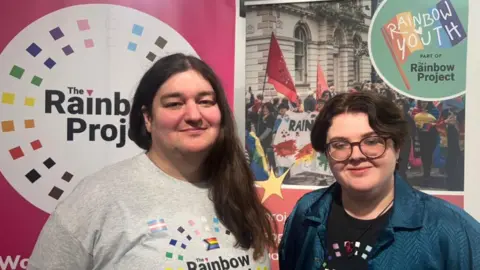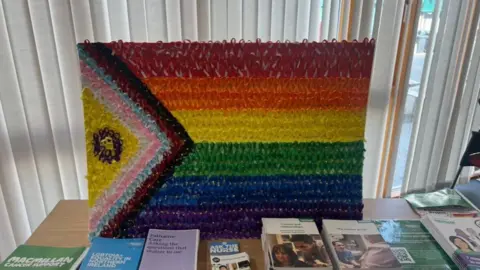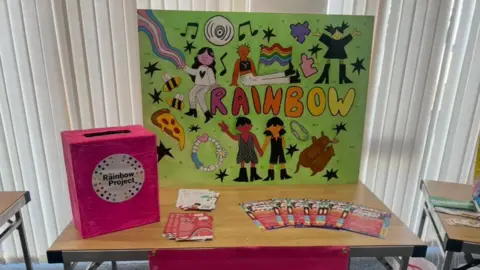LGBT people outside Belfast 'should have same healthcare access'
 BBC
BBCLGBT people living outside Belfast should have the same access to healthcare as everyone else, the CEO of advocacy group the Rainbow Project has said.
Scott Cuthbertson said people could be more at risk of cancer if they are too afraid to access services because of their identity.
He was speaking at the Londonderry launch of a service that aims to increase inclusivity in healthcare, with workshops offered to staff and to members of the LGBT community.
The Cancer Champion Service was launched in Belfast last August and has now expanded to Derry and Strabane.
It aims to make sure that LGBT people know what health services they can avail of and that medical staff have a better understanding of how to address people who have changed their pronouns.
The Rainbow Project runs the service in conjunction with Macmillan Cancer Support, health trusts and the Public Health Agency (PHA).
Mr Cuthbertson said it aims to increase how many LGBT people go forward for screening, as some could be at risk if they are too afraid to access services because of who they are.
"If you're a trans woman for example, breast screening is maybe not something on your mind, and the same for trans men," he said.
"For a long time, LGBT people in rural parts of the UK and Ireland have been forced to move to big cities to get sexual health testing and to meet people like themselves, and we just feel that they shouldn't have to do that anymore."

One of the examples of how the service is working is by educating people on what they can avail of, like asking for extra time and making sure the correct pronouns are used.
For example, a walkthrough video has been created showing what a trans woman can expect at a breast cancer screening.
For employees in the healthcare industry, members of the Rainbow Project have held conferences and meetings to educate staff on how to respectfully interact with members of the community.
Cervical screenings
Attending medical appointments has often been uncomfortable for Amie Martin, who identifies as non-binary and uses they/them pronouns.
Amie says that some medical staff have unwittingly not known to use those pronouns during appointments.
But Amie feels nobody should be put off accessing vital healthcare - for example cervical screenings formerly known as smear tests.
"It's that thing of just making sure that they know all the information that they can get and that they feel like they can be their authentic selves as they go through their cancer journey," Amie said.
Amie's negative experience with health appointments is shared by friend Samantha Devlin, who said people she knows have experienced anxiety due to a lack of awareness by some medical staff when it comes to gender identity.
Another person at the event said they wouldn't know where to start if they wanted to be screened for cancer, while another said he would feel uncomfortable or look like an outsider going to screenings as a transgender man.

Julian Backhouse from Macmillan Cancer Support said: "Together we will break down unnecessary and unacceptable barriers to inclusion."
The Department of Health told BBC News NI: "Cancer affects everyone, from all backgrounds, and all communities. It is essential that everyone has equal access to the health and social care services that they require."

The department added that the service would "play a key role in supporting health and social care staff who are supporting individuals with cancer".
